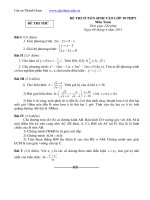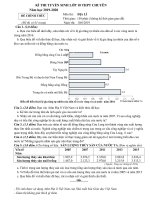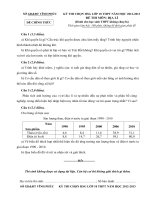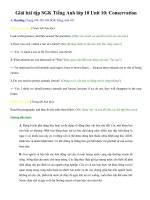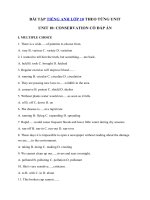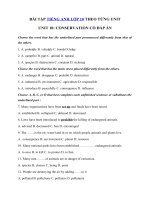Luyện kỹ năng đọc hiểu Tiếng Anh thi vào lớp 10
Bạn đang xem bản rút gọn của tài liệu. Xem và tải ngay bản đầy đủ của tài liệu tại đây (9.34 MB, 120 trang )
ĐỌC HIẾU TIÊNG ANH
ON THIVAO Lop 10
PHAN ĐỌC HIẾU
FAMILY LIFE IN THE UNITED STATES
Family life in the United States is changing. Fifty or sixty years ago, the wife was called
a “housewife”. She cleaned, cooked, and cared for the children. The husband eared
the money for the family. He was usually out working all day. He came home tired in the
evening, so he did not do much housework. And he did not see the children very much,
‘except on weekends.
These days, however, more and more women work outside the home. They cannot stay
with the children all day. They, too, come home tired in the evening. They do not want to
spend the evening cooking dinner and cleaning up. They do not have time to clean the
house and do the laundry. So who is going to do the housework now? Who is going to
take care of the children?
Many families solve the problem of housework by sharing it. In these families, the
husband and wife agree to do different jobs around the house, or they take turns doing
each job. For example, the husband always cooks dinner and the wife always does the
laundry. Or the wife cooks dinner on some nights and the husband cooks dinner on
other nights.
Then there is the question of the children. In the past, many families got help with child
care from grandparents. Now families usually do not live near their relatives. The
grandparents are often too far away to help in a regular way. More often, parents have
to pay for child care help. The help may be a babysitter or a day-care center. The
problem with t his kind of help is the high cost. It is possible only for couples with jobs
that pay well.
Parents may get another kind of help form the companies they work for. Many
‘companies now let people with children work part-time. That way, parents can spend
more time with their children. Some husbands may even stop working for a while to stay
with the children. For these men there is a new word. they are called "househusbands”.
In the USA more and more men are becoming househusbands every year.
‘These changes in the home mean changes in the family. Fathers can learn toø me
understand their children better, and the children can get to know their fathers better.
Husbands and wives may also find changes in their marriage. They, too, may have a
better understanding of each other.
Question 1: Sixty years ago, most women
1. went out to work B. had no children
2. did not do much housework D. were housewives
Question 2: Nowadays, there are,
more women going out to work than before
more and more women staying with the children all day
more work outside the home than before
4. more housewives than before
Question 3: The word “laundry” in paragraph 2 is closest in meaning to,
1. tidying up B. cooking and washing up
2. washing and ironing D. Shopping
Question 4: It can be inferred from paragraph 4 that,
1. couples with low-paid jobs can't afford the cost of a babysitter or a day-care
center
2. grandparents can help care the children in a regular way
3. all couples with jobs can pay for help from a babysitter or a day-care center
4. in the past, grandparents did not help the couples with child care
Question 5: The word ‘they’ in paragraph 5 refers to
1. husbands who stop working to stay with the children
2. fathers who spend more time with their children
3. parents who work part-time
4. children who spend more time with fathers than
Question 6: The changes in the American home mentioned in this passage
may
1. help families B. not happen
2. cause problems for a marriage D. not change the children at all
Question 7: This article is about
1. American men as househusbands B. housewives in America
2. how more American women are working D. how family life in America is
changing
Question 8: What does the companies in USA do to help parents?
1. Pay them more. B. pay for hiring babysitter.
2. allow parents to work less than the usual. D. help them to bring up their
children.
The nuclear family, consisting of a mother, father, and their children, may be more an
American ideal than an American reality. Of course, the so-called traditional American
family was always more varied than we had been led to believe, reflecting the very
different racial, ethnic, class, and religious customs among different American groups.
The most recent government statistics reveal that only about one third of
all current American families fit the traditional mold and another third consists of
married couples who either have no children or have none still living at home. Of the
final one third, about 20 percent of the total
number of American households are single people, usually women over sixty-five years
of age. A small percentage, about 3 percent of the total, consists of unmarried people
who choose to live together; and the rest, about 7 percent are single, usually divorced
parents, with at least one child. Today, these varied family types are typical, and
therefore, normal. Apparently, many Americans are achieving supportive relationships
in family forms other than the traditional one.
Question 9: With what topic is the passage mainly concerned?
1. The traditional American family B. The nuclear family
2. The current American family D. The ideal family
Question 10: The writer implies that,
1. there have always been a wide variety of family arrangement in the United
States
2. racial, ethnic, and religious groups have preserved the traditional family
structure
3. the ideal American family is the best structure
4. fewer married couples are having children
Question 11: The word ‘current’ in line 7 could best be replaced by which of the
following?
1. typical B. present C. perfect D. traditional
Question 12: In the passage, married couples whose children have grown or who have
no children represent,
1. 1/3 percent of households B. 20 percent of households
2. 7 percent of households D. 3 percent of households
Question 13: Who generally constitutes a one-person household?
1. Assingle man in his twenties B. An elderly man
2. Asingle woman in her late sixties D. A divorced woman
Question 14: What is nuclear family?
a social unit composed of two parents and one or morewne
a family consisting of a family nucleus and various relatives, as
afamily in which a parent brings up a child or children alone, without a partner
4. a hard-up family
Question 15: Unmarried people living together represent,
1. 3 percent B. 20 percent C. 7 percent D. 1/3 percent
In the world today, particularly in the two most industrialized areas, North America and
Europe, recycling is big news. People are talking about it, practicing it, and discovering
new ways to be sensitive to the environment. Recycling means finding was to use
products a second time. The motto of the recycling movement is "Reduce, Reuse,
Recycle”. The first step is to reduce garbage. In stores, a shopper has to buy products
in blister packs, boxes and expensive plastic wrappings. A hamburger from a fast food
restaurant comes in lots of packaging. usually paper, a box, and a bag. All thatwne
packaging is wasted resources. People should try to buy things that are wrapped
simply, and to reuse cups and utensils. Another way to reduce waste is to buy high-
quality products. When low quality appliances break, many customers throw them away
and buy new ones - a loss of more resources and more energy. For example, if a
customer buys a high- quality appliance that can be easily repaired, the manufacturer
receives an important message. In the same way, if a customer chooses a product with
less packaging, that customer sends an important message to the manufacturers. To
reduce garbage, the throwaway must stop.
The second step is to reuse. It is better to buy juices and soft drinks in retumable.
bottles. After customers empty the bottles, they retum them to the store. The
manufacturers of the drinks collect the bottles, wash them, and then fill them again. The
energy that is necessary to make new bottles is saved. In some parts of the world,
returning bottles for money is a common practice. In those places, the garbage dumps
have relatively little glass and plastic from throwaway bottles.
The third step is being environmentally sensitive is to recycle. Spent motor oil can be
cleaned and used again. Aluminum cans are expensive to make. It takes the same
amount of energy to make one aluminum can as it does to run a color TV set for three
hours. When people collect and recycle aluminum (for new cans), they help save one of
the world's precious resources.
Question 16: What is the main topic of the passage?.
How to reduce garbage
What people often understand about the term ‘recycle’
What is involved in the recycling
4. How to live sensitively to the
Question 17: People can do the following to reduce waste EXCEPT.
1. buy high-quality product. B. buy simply-wrapped things
2. reuse cups. D. buy fewer hamburgers.
Question 18: Why is it a waste when customers buy low-quality products?
1. Because people will soon throw them
2. Because they have to be repaired manyð MP
3. Because customers change their ideas all the
4. Because they produce less
Question 19: What best describes the process of reuse?
The bottles are collected, washed, returned and filled again.
The bottles are filled again after being returned, collected and
The bottles are washed, retuned, filled again and
4. The bottles are collected, returned filled again and
Question 20: What are the two things mentioned as examples of recycling?
1.. Aluminum cans and plastic wrappings. B. Hamburger wrappings and spent
motor oil.
2. Aluminum cans and spent motor oil. D. TV sets and aluminum cans.
An air pollutant is defined as a compound added directly or indirectly by humans to the
atmosphere in such quantities as to affect humans, animals, vegetation, or
materials adversely. Air pollution requires a very flexible definition that permits
continuous change. When the first air pollution laws were established in England in the
fourteenth century, air pollutants were limited to compounds that could be seen or
smelled - a far cry from the extensive list of harmful substances known today. As
technology has developed and knowledge of the health aspects of various chemicals
has increased, the list of air pollutants has lengthened. In the future, even water vapor
might be considered an air pollutant under certain conditions.
Many of the more important air pollutants, such as sulfur oxides, carbon monoxide, and
nitrogen oxides, are found in nature. As the Earth developed, the concentration of these
pollutants was altered by various chemical reactions; they became components in
biogeochemical cycles. These serve as an air purification scheme by allowing the
‘compounds to move from the air to the water or soil. On a global basis, nature's output
of these compounds dwarfs that resulting from human activities.
However, human production usually occurs in a localized area, such as a city. In suchø MP
a region, human output may be dominant and may temporarily overload the natural
purification scheme of the cycles. The result is an increased concentration of noxious„MP
chemicals in the air. The concentrations at which the adverse effects appear will be
greater than the concentrations that the pollutants would have in the absence of humanø me
activities. The actual concentration need not be large for a substance to be a pollutant;
in fact, the numerical value tells us little until we know how much of an increase this
represents over the concentration that would occur naturally in the area. For example,
sulfur dioxide has detectable health effects at 0.08 parts per million (ppm), which is
about 400 times its natural level. Carbon monoxide, however, has a natural level of 0.1
ppm and is not usually apollutant until its level reaches about 15 ppm.
Question 21: What does the passage mainly discuss?
The economic impact of air
What constitutes an air
How much harm air pollutants can
4. The effects of compounds added to the
Question 22: It can be inferred from the first paragraph that. .
water vapor is an air pollutant in localized areas
most air pollutants today can be seen or smelled
the definition of air pollution will continue to change
4. a substance becomes an air pollutant only in cities
Question 23: For which of the following reasons can natural pollutants play an
important role in controlling air pollution?
They function as part of a purification
They occur in greater quantities than other
They are less harmful to living beings than other
4. They have existed since the Earth
Question 24: According to the passage, human-generated air pollution in localized
regions
can be dwarfed by nature's output of pollutantswne
can overwhelm the natural system that removes pollutants
will damage areas outside of the localized regions
4. will react harmfully with natural pollutants
Question 25: The word “localized” in the third paragraph is closest in meaning
to,
1. specified B. circled C. surrounded D. encircled
Question 26: According to the passage, the numerical value of the concentration level
of a substance is only useful if.
1. the other substances in the area are known B. itis in a localized area
2. the natural level is also known D. it can be calculated quickly
Question 27: Which of the following is best supported by the passage?
1. To effectively control pollution, local government should regularly review their
air pollution laws.
2. One of the most important steps in preserving natural lands is to better
enforce air pollution laws.
3. Scientists should be consulted in order to establish uniform limits for all air
4. Human activities have been effective in reducing air
Long ago prehistoric man began to domesticate a number of wild plants and animals for
his own use. This not only provided a more abundant food source but also allowed
more people to live on a smaller plot of ground. We tend to forget that all of our present-
day pets, livestock, and food plants were taken from the wild and developed into the.
forms we know today.
As centuries passed and human cultures evolved and blossomed, humans began to
organise their knowledge of nature into the broad field of natural history. One aspect of
early natural history concerned the use of plants for drugs and medicine. The early
herbalists sometimes overworked their imaginations in this respect. For example, it
was widely believed that a plant or part of a plant that resembles an internal organ
would cure ailments of that organ. Thus, an extract made from a heartshaped leaf
might be prescribed for a person suffering from heart problems.
Nevertheless, the overall contributions of these early observers provided
the rudiments of our present knowledge of drugs and their uses.
Question 28: What does this passage mainly discuss?
1. Cures from plants B. The beginning of natural history
2. Prehistoric man D. Early plants and animals
Question 29: Domestication of plants and animals probably occurred because
of,
the need for more readily available foodø me
lack of wild animals and plant
early man's power as a hunter
4. the desire of prehistoric man to be nomadic
Question 30: The word “This” in the first paragraph refers to,
providing food for manwne
man’s domestication of plants and animals
man’s ability to live on a small plot of land
4. the earliest condition of prehistoric man
Question 31: The word “blossomed” in the second paragraph is closest in meaning
to,
1. produced flowers B. changed C. leamed D. flourished
Question 32: An herbalist is which of the following?
1. Adreamer B. An early historian
2. Someone who uses plants in medicine D. A farmer
Millions of people are using cellphones today. In many places, it is actually considered
unusual not to use one. In many countries, cellphones are very popular with young
people. They find that the phones are more than a means of communication - having a
mobile phone shows that they are cool and connected.
The explosion in mobile phone use around the world has made some health
professionals worried. Some doctors are concerned that in the future many people may
suffer health problems from the use of mobile phones. In England, there has been a
serious debate about this issue.
Mobile phone companies are worried about the negative publicity of such ideas. They
say that there is no proof that mobile phones are bad for your health.
On the other hand, medical studies have shown changes in the brain cells of some
people who use mobile phones. Signs of change in the tissues of the brain and head
can be detected with modem scanning equipment. In one case, a traveling salesman
had to retire at young age because of serious memory loss. He couldn't remember even
simple tasks. He would often forget the name of his own son. This man used to talk on
his mobile phone for about six hours a day, every day of his working week, for a couple
of years. His family doctor blamed his mobile phone use, but his employer's doctor
didn't agree.
What is it that makes mobile phones potentially harmful? The answer is radiation.
High-tech machines can detect very small amounts of radiation from mobile phones.
Mobile phone companies agree that there is some radiation, but they say the amount is
too small to worry about. As the discussion about their safety continues, it appears that
it's best to use mobile phones less often. Use your regular phone if you want to talk for
a long time. Use your mobile phone only when you really need it. Mobile phones can be
very useful and convenient, especially in emergencies. In the future, mobile phones
may have a warning label that says they are bad for your health. So for now, it's wise
not to use your mobile phone too often.
Question 33: The most suitable title for the passage could be,
1. “The Reasons Why Mobile Phones Are Popular”
2. “Mobile Phones. A Must of Our Time”
3. “The Way Mobile Phones Work”ð MP
4 “Technological Innovations and Their Price”
ø MP
Question 34: According to the passage, cellphones are especially popular with young
people because__.1 P
they make them look more stylishø me
they are indispensable in every day communications
they keep the users alert all the time
4 they cannot be replaced by regular phones
Question 35: The changes possibly caused by the cellphones are mainly concemed
with_,
the mobility of the mind and the body
the resident memory
the arteries of the brain
4. the smallest units of the brain
Question 36: According to the passage, what makes mobile phones potentially harmful
is
their radiant light
their power of attraction
their raiding power
4. their invisible rays
Question 37: According to the writer, people should
never use mobile phones in all cases
only use mobile phones in medical emergencies
keep off mobile phones regularly
4 only use mobile phones in urgent cases
Question 38: The man mentioned in the passage, who used his cellphone too
often,
1 suffered serious loss of mental ability
2 had a problem with memory
3. abandoned his family
4. could no longer think lucidly
Question 39: The word "potentially" in the passage most closely means
1. obviously B. possibly C. certainly D. privately
Most people think that lions only come from Africa. This is understandable because in
fact most lions do come from there but this has not always been the case. If we went
back ten thousand years. we would find that there were lions roaming vast sections of
the globe. However now, unfortunately only a very small section of the lion's former
habitat remains.
Asiatic lions are sub-species of African lions. It is almost a hundred thousand years
since the Asiatic lions split off and developed as a sub-species. At one time the Asiatic
lion was living as far west as Greece and they were found from there, but ina band that
spreads east through various countries of the Middle East, all the way to India. In
museums now, you can see Greek coins that have clear images of the Asiatic lion on
them. Most of them are dated at around 500
B.C. However, Europe saw its last Asiatic lions roaming free to thousand years ago.
Over the next nineteen hundred years the numbers of Asiatic lions in the other areas
declined steadily, but it was only in the nineteenth century that they disappeared from
everywhere but in India.
The Gir Wildlife Sanctuary in India was established especially to protect the Asiatic lion.
There are now around three hundred Asiatic lions in India and almost all of them are in
this sanctuary. However, despite living in a sanctuary, which makes them safe from
hunters, they still face a number of problems that threaten their survival. One of these is
the ever-present danger of disease. This is what killed more than a third of Africa's
Serengeti lions in 1994, and people are fearful that something similar could happen in
the Gir Sanctuary and kill off many of the Asiatic lions there. India's lions are
particular vulnerable because they have a limited gene pool. The reason for this is
interesting — it is because all of them are descended from a few dozen lions that were
saved by a prince who took aparticular interest in them. He was very healthy, and he
managed to protect them otherwise they would probably have died out completely.
When you see the Asiatic lion in India, what you sense is enormous vitality. They are
very impressive animals and you would never guess that they this vulnerability when
you look at them.
Question 40: According to the passage, ten thousand years ago,
1. lions did not live in small forests
2. lions came mainly from Africa
3. lions roamed much more than nowadays
4. there were much more lion habitats than nowadays
Question 41: The phrase “split off” in the second paragraph is closest in meaning
to,
1. spotted animals B. divided
2. developed into different species D. changed the original species
Question 42: The word “vulnerable” in paragraph 4 is closest in meaning
to,
1. weak B. careless C. cautious D. easily protected
Question 43: The Asiatic lion,
was looking for food mainly in the Middle East1 P
was searching for food in a wide range of countries
was searching for food mainly in India and Africa
4. was looking for food mainly in India
Question 44: According to the author, the Gir Wildlife Sanctuary.
1. protects the Asiatic lion from hunters and diseases
2. cannot reduce the Asiatic lion's risk of catching diseases
3. can make the Asiatic lion become weak
4. is among many places where the Asiatic lion is well protected
Question 45: The author refers to all of the following as characteristics of the Asiatic
lion EXCEPT that,
1. strong B. vulnerable C. vital D. impressive
Question 46: The passage is written to,
persuade readers to protect the Asiatic lionsAwe
explain why the Gir Sanctuary is the best habitat for the Asiatic lions
describe the developmental history of the Gir Sanctuary
provide an overview of the existence of the Asiatic lions
If you enjoy water sports, Hawaii is the place for you. You can go swimming all year
round in the warm water. You can go sport fishing from the shore or from a boat. If you
like boats, you can go sailing, canoeing, or windsurfing. Or, you can also try some other
water sports that are especially popular in Hawaii. surfing, snorkeling and scuba diving
Surfing is a sport which started in Hawaii many years ago. The Hawaiians called it “he'e
nalu", which means ‘to slide on a wave". If you want to try surfing, you need, first of all,
to be a good swimmer. You also have to have an excellent sense of balance. You must
swim out from the beach with your surfboard under your arm. When you get to where
the waves begin to break, you wait for a calm moment. Then you try to stand up on the
board. The wave will begin to rise under you. You must try to steer the board with your
feet so you stay on top of the wave. The important thing is to keep your balance and not
fall down. If you can manage this, you will have an exciting ride all the way in to the
shore.
Scuba diving and snorkeling are two ways to get a close look at the beauty lying below
the surface of the ocean. The waters off the Hawaiian Islands are clean, clear and
warm. They contain hundreds of kinds of colorful fish. The undersea world is made even
more colorful by the coral reefs of red, gold, white and light purple. Among these reefs
there may be larger fish or sea turtles. Scuba diving allows you to see the most
interesting undersea sights. “Scuba’ means
“Self- contained Underwater Breathing Apparatus’, that is, equipment for breathing and
swimming around far under water. In Hawaii, you can take special courses to learn how
to scuba dive. After the courses, you can get a certificate that will allow you to dive
alone. Since it can be dangerous, proper instruction and great care are always
necessary when you are scuba diving
Ifyou are adventurous, you might try snorkeling instead of scuba diving. Lessø me
‘equipment is needed, justa face mask, a breathing tube (snorkel) and flippers for your
feet. It only takes a few minutes to learn how to snorkel. Although you cannot dive deepwne
into the water, you can swim with your face below the surface. Breathing through the
tube, you float on the surface, and keep yourself moving with your flippers. Even from
the surface like this, there will be plenty of color and beauty to see.
Question 47: The passage is about,
1. water sports around the world B. surfing
2. tourist activities in Hawaii D. water sports in Hawaii
Question 48: You can infer from the passage that,
water sports are all expensive
you need to take a course for all water sports
everyone can find a way to enjoy sports in the water
4. swimming in Hawaii can be dangerous
Question 49: According to the passage, surfing,
began as a sport in 1943
was invented by the native Hawaiians
requires expensive equipment
4. is very dangerous
Question 50: The water around the Hawaiian Islands is.
1. often quite cold B. full of colorful things to see
2. usually very dark D. full of dangerous fish
Question 51: The word “this” in the second paragraph refers to
1. standing on the board B. keeping balanced and not falling down
2. an exciting ride D. staying on top of the wave
Question 52: According to the passage, scuba diving
1. is an ancient Hawaiian water sport
2. requires special equipment and training
3. is the only way to see the fish underwater
4. requires good balance
Question 53: The word ‘proper’ in paragraph 4 refers to.
1. enthusiastic B. informative C. appropriate D. short and clear
Question 54: Which statement is supported by the information in the passage?
1. Snorkeling involves breathing through the tube, floating on the surface and
moving with flippers
2. Snorkeling requires more expensive equipment than scuba diving
3. Snorkeling is for adventurous people
4. Snorkeling was invented in ancient times
Over the past 600 years, English has grown from a language of few speakers to
become the dominant language of international communication. English as we know it
today emerged around 1350, after having incorporated many elements of French that
were introduced following the Norman invasion off 1066. Until the 1600s, English was,
for the most part, spoken only in England and had not expanded even as far as Wales,
Scotland, or Ireland. However, during the course of the next two century, English began
to spread around the globe as a result of exploration, trade (including slave trade),
colonization, and missionary work. Thus, small enclaves of English, speakers became
established and grew in various parts of the world. As these communities proliferated,
English gradually became the primary language of international business, banking, and
diplomacy.
Currently, about 80 percent of the information stored on computer systems worldwide is
in English. Two thirds of the world's science writing is in English, and English is the main
language of technology, advertising, media, international airport, and air traffic
controllers. Today there are more than 700 million English users in the world, and over
half of these are non-native speakers, constituting the largest number of non-native
users than any other language in the world.
Question 55: What is the main topic of the passage?
RwWNe The number of non-native users of
The French influence on the English
The expansion of English as an international
The use of English for science and
Question 56: In the first paragraph, the word "emerged" is closest in meaning
to
1. appeared B. hailed C. frequented D. engaged
Question 57: In the first paragraph, the word "elements" is closest in meaning
to
1. declaration B. features C. curiosities D. customs
Question 58: Approximately when did English begin to be used beyond England?
1. In 1066 B. around 1350 C. before 1600 D. after 1600
Question 59: According to the passage, all of the following contributed to the spread of
English around the world except,
1. the slave trade B. the Norman invasion C. missionaries D.
colonization
Question 60: In the second paragraph, the word "stored" is closest in meaning
to,
1. bought B. saved C. spent D. valued
Question 61: According to the passage, approximately how many non-native users of
English are there in the world today ?
1. a quarter million B. half a million C. 350 million D. 700 million
One of the highest honors for formalists, writers, and musical composers is the Pulitzer
Prize. First awarded in 1927, the Pulitzer Prize has been won by Ernest Hemingway,
Harper Lee, John
1. Kennedy, and Rodgers and Hammerstein, among others. As with many
famous awards, this prize was named after its founder, Joseph Pulitzer.
Joseph Pulitzer's story, like that of many immigrants to the United States, is one of
hardship, hard work and triumph. Born in Hungary, Joseph Pulitzer moved to United
States in 1864. He wanted to be a reporter, but he started his American life by fighting
in the American Civil War. After the war, Pulitzer worked for the German - language
newspaper, the Westliche Post. His skills as a reporter were wonderful, and he soonø me
became a partial owner of the paper.
In 1978, Pulitzer was able to start a newspaper of his own. Right from the first edition,
the newspaper took a controversial approach to new. Pulitzer wanted to appeal to the
average reader, so he produced exciting stories of scandal and intrigue. Such an
approach is commonplace today, but in Pulitzer's time it was new and different. The
approach led to the discovery of many
instances of corruption by influential people. Pulitzer ‘paper became very famous and is
still produced today.
The success of Joseph Pulitzer’s newspaper made him a very wealthy man, so he
wanted to give something back to his profession. Throughout his later years, he worked
to establish university
programs for the teaching of journalism, and he funded numerous scholarships to assist
journalism students. Finally, he wanted to leave a legacy that would encourage writers
to remembethre importance of quality. On his death, he gave two million dollars to
Columbia University so they could award prizes to great writers.
The Pulitzer Prize recipients are a very select group. For most, winning a Pulitzer Prize
is the highlight of their career. if an author, journalist, or composer you know has won a
Pulitzer Prize, you can be sure they are at the top of their profession.
Question 62: Why does the writer mention "John F. Kennedy’ in line 37
He was one of the inventors of the famous
He was one of the winners of the Pulitzer
He was one of the people who selected the Pulitzer
4. He was in one of the scandals reported on by Joseph
Question 63: According to the reading passage, why did Joseph Pulitzer invent the
Pulitzer Prize?
1. to encourage people to remember his name and success
2. encourage writers to remember the importance of quality
3. to encourage journalism students to achieve their goals
4. to encourage work of the Pulitzer winners
Question 64: The word “partial” in the passage is closest in meaning to.......
1. in part only B. brand new C. one and only D. very important
‘Question 65: According the passage, who receives the Pulitzer Prize?
1. Columbia University graduates B. journalism students
2. noted writers and composers D. most newspaper reporters
Question 66: According to the reading passage, how did Joseph Pulitzer appeal to the
average reader?
He wrote about famous writers of journalism and literatureø MP
He wrote stories about the war
He produced his own newspaper
4. He produced exciting stories of scandal and intrigue
Question 67: Which sentence about Joseph Pulitzer is true according to the reading
passage?
He received a scholarship when he was a universitywne
He was rich even when he was young
He was a reporter during the American Civil War
4. He immigrated to the United States from Hungary
Question 68: Which sentence about Joseph Pulitzer is NOT true according to the
reading passage?
1917. oseph Pulitzer was the first writer to the win the prize in
1918. The prize is aimed at encouraging a writer's
1919. Joseph Pulitzer left money to award to the
1920. Receiving the prize is one of the highest honors for
We find that bright children are rarely held back by mixed-ability teaching. On the
contrary, both their knowledge and experience are enriched. We feel that there are
